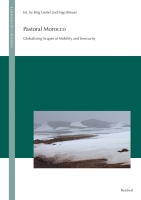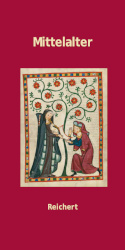Search
Editors: Gertel, Jörg; Breuer, Ingo
Pastoral Morocco
Globalizing Scapes of Mobility and Insecurity
2007
17.0 x 24.0 cm, 268 p., 17 maps, 26 illustrations b/w, 17 maps, hardback
ISBN: 9783895005527
17.0 x 24.0 cm, 268 p., 17 maps, 26 illustrations b/w, 17 maps, hardback
54,00 €
ISBN: 9783895005527
Short Description
Pastoral Morocco explores the mobility of people and livestock in the context of neo-liberal globalization. Mobility is defined as a strategy to maintain and enhance access to resources, and hence comprehended as a strategy of pastoralists to cope with insecurity and new risks. Pastoral livelihoods in Morocco are, as the authors point out, increasingly shaped by processes unfolding outside the realm of animal production, for instance by dynamics of labor migration, changing property rights, and new means of communication. This volume examines local consequences of agro-pastoral restructuring. It investigates, for example, the invention of pastoral cooperatives, analyzes territorial changes triggered by urbanization and new spaces of enterprises, assesses the importance of cross border trade and sheep-commodity chains, scrutinizes the complexity and vulnerability of livelihood portfolios and it ultimately inquires the genealogy of conflicts over pastures. Pastoral Morocco draws on intensive empirical fieldwork and captures the regional diversities of the country. It is the first English language volume that combines Moroccan and European expertise about the changing world of mobility and insecurity that Moroccan pastoralists inhabit.Description
„Pastoral Morocco“ explores the mobility of people and livestock in the context of neo-liberal globalization. Mobility is defined as a strategy to maintain and enhance access to resources, and hence comprehended as a strategy of pastoralists to cope with insecurity and new risks. Pastoral livelihoods in Morocco are, as the authors point out, increasingly shaped by processes unfolding outside the realm of animal production, for instance by dynamics of labor migration, changing property rights, and new means of communication. This volume examines local consequences of agro-pastoral restructuring. It investigates, for example, the invention of pastoral cooperatives, analyzes territorial changes triggered by urbanization and new spaces of enterprises, assesses the importance of cross border trade and sheep-commodity chains, scrutinizes the complexity and vulnerability of livelihood portfolios and it ultimately inquires the genealogy of conflicts over pastures. This volume draws on intensive empirical fieldwork and captures the regional diversities of the country. It is the first English language volume that combines Moroccan and European expertise about the changing world of mobility and insecurity that Moroccan pastoralists inhabit.Reviews
„Pastoral Morocco is an innovative approach to grasp the importance of pastoralism as it is observed an interpreted in present-day Morocco. The volume is roughly divided into two sections. Three papers constitute the first part in which the scope of pastoralism is explicated in a conceptual framework, in time and space and as embedded in the world market. (...) These three chapters set the stage for the second part with ten contributions titled „regional geographies of pastoral Morocco“. Here we encounter worthwhile case studies (...).The major contribution of this volume to pastoralism is a two-fold one. The editors have succeeded in convening a group of researchers that presented the readership with a comprehensive overview of vital topics in pastoralism research in Morocco, content- and region-wise. Secondly, this volume offers a state-of-the-art tome in the English language for comparative studies to colleagues who are interested in recent developments in Morocco and in their linkages beyond the place.“
In: Erdkunde. Vol. 63 (2009) No. 2. S. 198-199.
Series Description
No english description available. Showing german description:
Hg. im Auftrag des SFB von Jörg Gertel, Stefan Leder,
Jürgen Paul und Bernhard Streck
Nomadische und sesshafte Lebensformen koexistieren in weiten Teilen der Welt, insbesondere im altweltlichen Trockengürtel, seit mehreren tausend Jahren. Die Erforschung ihrer Interaktion soll in der Reihe Nomaden und Sesshafte dokumentiert werden. Erst seit vergleichsweise wenigen Jahren hat die Einsicht an Geltung gewonnen, dass Nomadismus als Teil übergreifender ökologischer, ökonomischer, politischer und kultureller Systeme in den Blick genommen zu werden verdient, weil Formen des Kontakts mit der Welt der Sesshaften historische Zivilisationen über lange Zeiträume mitgeprägt haben und noch heute, unter anderen Bedingungen, Wirkung entfalten. Austausch und Konflikt zwischen Nomaden und Sesshaften, wie auch Prozesse der Anpassung und Abgrenzung haben sich auf unterschiedliche Lebensbereiche ausgewirkt. Ökonomie und Militärwesen, politische und soziale Ordnungen, Sprache und in Kunst, Vorstellungswelten und Identitätskonstruktionen geben dies zu erkennen. Mit der Wahrnehmung der Vielfalt und Wirkmächtigkeit dieser Interaktion ist eine Forschungsperspektive angelegt, welche die Aufgaben des 2001 einrichteten Sonderforschungsbereichs "Differenz und Integration – Wechselwirkung zwischen nomadischen und sesshaften Lebensformen in Zivilisationen der Alten Welt" bestimmt.
Der interdisziplinäre Rahmen des Sonderforschungsbereichs erlaubt die Beteiligung mehrerer Disziplinen, wie Archäologie und Geschichte, Literaturwissenschaft und Ethnologie, Geographie und Agrarökonomie; ihr Zusammenwirken verspricht Erträge, die eine Vielzahl von Perspektiven und Wissensbereichen erschließen.




 Preface
Preface

 Neuerscheinungen 2023/2024
Neuerscheinungen 2023/2024
 Gesamtverzeichnis 2023/2024
Gesamtverzeichnis 2023/2024
 Katalog Oriental Studies & Linguistics
Katalog Oriental Studies & Linguistics
 Mittelalter
Mittelalter
 Deutsche Inschriften
Deutsche Inschriften
 Musiktherapie
Musiktherapie
 Literaturen im Kontext
Literaturen im Kontext